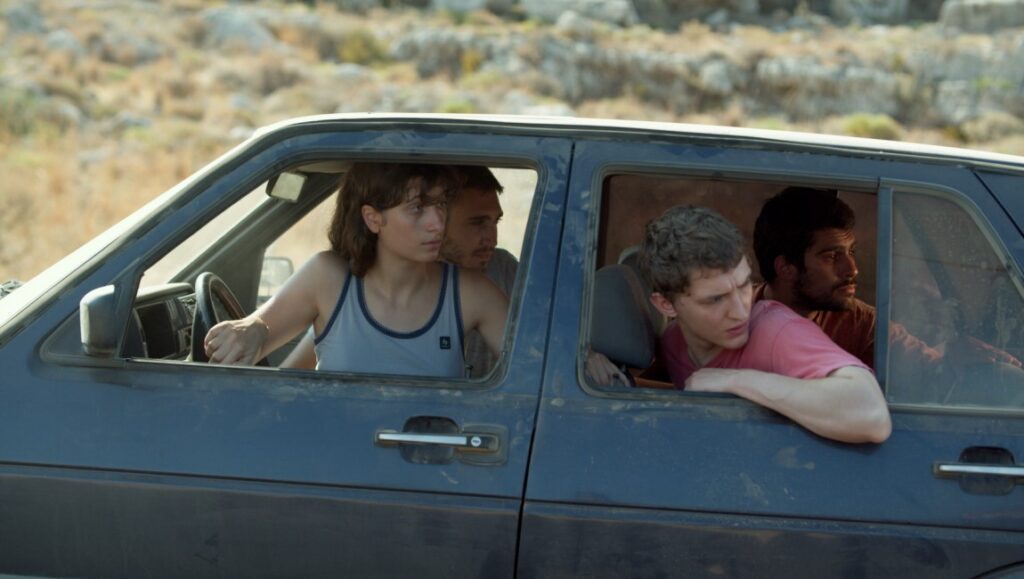Read a review of any of Angela Schanelec’s feature films and you’re bound to encounter adjectives like “elliptical,” “confounding,” and “obscure.” It’s true — the German filmmaker has a peculiar approach to storytelling, favoring all manner of narrative obfuscation while honing in on movements, gestures, and that most basic building block of cinema: the image itself. Echoes of Bresson permeate her filmography, so too the works of Straub-Huillet, perhaps the key filmmakers of the second half of the 20th century (apologies to Godard). In any case, Schanelec has positioned herself as part of a specific lineage in Modernist European filmmaking. By eschewing establishing shots, standardized continuity editing, most narrative exposition, and even traditional temporal logic, Schanelec seems determined to perfect a kind of addition through subtraction. Her’s is a search for the essence of the thing. There’s a magic to it, if one can attune themselves to her sensibility.
After the (relative) success of her last feature, 2019’s I Was at Home, But…, Schanelec returns with Music, a loose retelling of the Oedipus myth that allows her to hang her formal and conceptual concerns onto a well-known framework. It doesn’t necessarily make everything “make sense,” but the familiarity allows audiences a kind of anchor to get their footing as Schanelec leaps past years in a single edit. Beginning with a torrential storm and a wailing man carrying what appears to be a dead body, paramedics arrive to discover a newborn baby with curious wounds on its ankles. One of the first responders, Elias (Argyris Xafis), takes the baby home to his wife, Merope (Marissa Triantafyllidou), and the two become the child’s de facto adopted parents. As Merope washes the child’s feet in the gentle ocean waves, we cut to a group of young adults out for a joy ride. It’s not until we see a shot of swollen, irritated ankles that we realize the baby is now fully grown. He’s named Jon, played for the rest of the film by Aliocha Schneider, and while we don’t get the full sense of his relationship with the other revelers, it’s only a few minutes before he is accosted by a strange man. Jon pushes the man away, who then accidentally cracks his head on a jagged rock and dies. Jon is quickly sent to prison, where he meets a female guard, Iro (Agathe Bonitzer). Upon Jon’s release, the pair fall in love and have a child. Eventually, they return to Jon’s parent’s home, where the remainder of this tragedy will unfold.
This brief synopsis doesn’t quite do justice to Schanelec’s austere and, yes, even elliptical storytelling. Favoring a mostly static camera, Schanelec films scenes from either a great distance, immersing characters in the natural landscape surrounding them, or in extreme closeups, singling out feet and legs or arms and cutting off the rest of the body at the edge of the frame. Large swaths of connective narrative tissue are excised altogether; for example, Jon’s stay in prison is represented by two brief sequences that imply violent altercations that aren’t actually shown, while Iro wiles the time away with her coworkers playing games. Further, Jon and Iro’s romance is constructed entirely out of furtive glances and longing looks, their affair solidified when Iro goes to a pharmacy to purchase ointment and bandages for his ankles. The two eventually hold hands, before the next shot reveals that Iro is pregnant, then another that shows her accompanied by a child roughly six or seven years old. In this sense, Music acts as a companion piece to The Dreamed Path, where Schanelec has two lovers separate and then meet again decades later, but makes no effort to “age them up.” Time becomes elusive, belying the otherwise realistic milieu at hand. Indeed, Schanelec’s willingness to infuse this ostensible realism with flights of fancy and formal game-playing links her to Rivette, of all people. Objects become important as both identifying markers and totems; Jon’s birth father is introduced wearing thick, black-rimmed glasses. When they meet again years later, he’s still wearing them, and later Jon will adopt a similar pair as his eyesight wanes with age. It’s all very precise, Schanelec’s rigorous formal control creating opaque connections and thrillingly unpredictable ellipses.
Anyone already familiar with the Oedipus tale will be well aware of the fate in store for several characters here, but curiously, Schanelec changes Jon’s part of the story. Rather than blinding himself after the death of his mother/wife, Jon instead carries on, becoming a musician (another echo of The Dreamed Path, whose protagonist strives to become a musician before succumbing to drug addiction). If the tale of Oedipus is understood as a warning about fate, Schanelec instead seems to be suggesting that we can, in fact, free ourselves from a predetermined path. Jon sings periodically throughout the film, but it’s not until after Iro’s death that he seems to fully embrace it. The film ends with a joyous promenade, full of singing and prancing, as Jon and his remaining family march toward an unknown future. Like all great films, Schanelec’s latest teaches you how to watch it. Music is a masterpiece.
DIRECTOR: Angela Schanelec; CAST: Aliocha Schneider, Agathe Bonitzer, Marissa Triantafyllidou, Argyris Xafis; DISTRIBUTOR: The Cinema Guild; IN THEATERS: June 28; RUNTIME: 1 hr. 48 min.
Originally published as part of InRO Weekly — Volume 1, Issue 8.5.


Comments are closed.